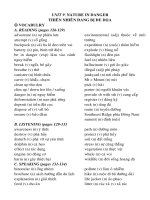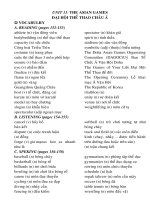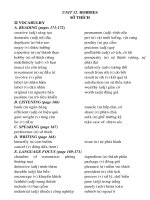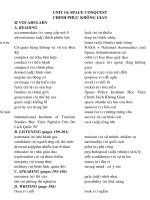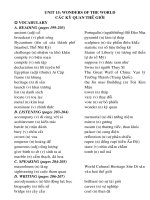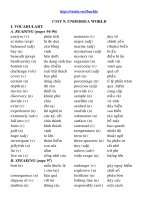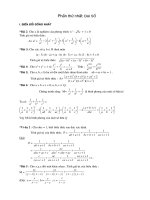BT LUYEN UNIT 72
Bạn đang xem bản rút gọn của tài liệu. Xem và tải ngay bản đầy đủ của tài liệu tại đây (132.25 KB, 6 trang )
<span class='text_page_counter'>(1)</span><div class='page_container' data-page=1>
<b>UNIT 7: WORLD POPULATION </b>
<b>* VOCABULARY:</b>
o A.D. (Anno Domini) (n)
sau công nguyên
o awareness (n)
[ə'weənis]ý thức
o B.C. (Before Christ) (n)
trước công nguyên
o billionaire (n)
[,biljə'neə]nhà tỉ phú
o birth-control method (n)
[bɜ:θkən'trəʊl 'meθəd]phương pháp hạn chế
sinh đẻ
o carry out (v)
['kỉri'aut]tiến hành
o claim (n,v)
[kleim](sự) đòi hỏi
o cranky (a)
['krỉηki]hay gắt gỏng, quạu
o creature (n)
['kri:t∫ə]sinh vaät
o death rate (n)
[deθreit]tỉ lệ tử vong
o developing country (n)
nước đang phát triển
o exercise (v)
['eksəsaiz]sử dụng,
tập luyệno expert (n)
['ekspə:t]chuyeân gia
o explosion (n)
[iks'plouʒn]sự bùng nổ
o family planning(n)
['fỉmili'plỉniη]kế hoạch hóa gia đình
o fresh water (n)
[fre∫ 'wɔ:tə]nước ngọt
o generation (n)
[,dʒenə'rei∫n]thế hệ
o glean (v)
[gli:n]mót, nhặt (lúa)
o government (n)
['gʌvnmənt]chính phủ
o growth (n)
[grəʊθ]tăng trưởng
o implement (v)
['implimənt]thực hiện
o improvement (n)
[im'pru:vmənt]sự cải thiện
o injury (n)
['indʒəri]chấn thương
o insurance (n)
[in'∫uərəns]sự bảo hiểm
o iron (n)
['aiən]saét
o journalism (n)
['dʒə:nəlizm]báo chí
o lack (n)
[lỉk]sự thiếu hụt
o limit (n)
['limit]giới hạn
o limit (v)
['limit]hạn chế
o limited (a)
['limitid]có giới hạn
o living condition (n)
['liviη kən'di∫n]điều kiện sống
o living standard (n)
['liviη'stỉndəd]mức sống
o metal (n)
['metl]kim loại
o organisation (n)
[,ɔ:gənai'zei∫n]tổ chức
o overpopulated (a)
[,ouvə'pɔpjuleitid]quá đông dân
o petroleum (n)
[pə'trəʊliəm]dầu mỏ, dầu hỏa
o policy (n)
['pɒləsi]chính sách
o population (n)
[,pɒpju'lei∫n]dân số
o punishment (n)
['pʌni∫mənt] sự trừng phạto quarrel (n,v)
['kwɔrəl](sự) cãi nhau
o raise (v)
[reiz]nuoâi
</div>
<span class='text_page_counter'>(2)</span><div class='page_container' data-page=2>
o religion (n)
[ri'lidʒən]tôn giáo
o resource (n)
[ri'sɔ:s ; ri'zɔ:s]tài nguyên
o reward (n)
[ri'wɔ:d]thưởng
o salt water (n)
[sɔ:lt'wɔ:tə]nước mặn
o silver (n)
['silvə]baïc
o solution (n)
[sə'lu:∫n]giải pháp
o step (v)
[step]bước, giậm lên
o the Third World (n)
thế giới thứ ba (những nước nghèo
hoặc đang phát triển ở châu Phi, châu Á, châu Mỹ la tinh)
o United Nations (n)
[ju:'naitid'nei∫nz]Liên hiệp quốc
<b>* GRAMMAR: </b>
<b>1. Conditional types 1, 2 and 3: (Câu điều kiện loại 1, 2 và 3)</b>
<b>1.1. Loại 1: </b>
<b>Diễn tả điều kiện CÓ THỂ XẢY RA ở hiện tại hoặc tương lai. </b>
<i>Ex: If it rains heavily, I will stay at home. </i>
<i>(Nếu trời mưa lớn thì tơi sẽ ở nhà.)</i>
<b>1.2. Loại 2: </b>
<i><b>Diễn tả điều kiện KHÔNG THỂ XẢY RA ở hiện tại hoặc tương lai. Ex1: If I had enough money, I would buy a </b></i>
<i>new bicycle. </i>
<i>(Nếu tơi có đủ tiền thì tôi sẽ mua một chiếc xe đạp mới) (Hiện tại tơi khơng có đủ tiền.) </i>
<i>Ex2: If I were a bird, I would fly everywhere. (Nếu tôi là chim, tôi sẽ bay khắp nơi.) (Tôi không thể là chim.) </i>
<b>1.3. Loại 3: </b>
<b>Diễn tả điều kiện KHÔNG THỂ XẢY RA ở quá khứ. </b>
<i>Ex: If John had studied harder, he wouldn’t have failed his exam. (Nếu John học chăm chỉ hơn, anh ta đã </i>
<i>không thi rớt.) (Sự thật là John đã không chăm chỉ và đã thi rớt.) </i>
<b>2. Conditional in reported speech: (Câu điều kiện trong lời nói gián tiếp) </b>
<b>2.1. Câu điều kiện loại 1 chuyển sang loại 2: </b>
<i>Ex: He said, “If it rains heavily, I will stay at home.” </i>
<i> He said (that) if it rained heavily, he would stay at home. </i><b>2.2. Câu điều kiện loại 2 và 3: không đổi động từ </b>
<i>Ex1: She said, “If I had enough money, I would buy a new bicycle.” </i>
<i> She said (that) if she had enough </i><i>money, she would buy a new bicycle. </i>
<i>Ex2: The teacher said, “If John had studied harder, he wouldn’t have failed his exam.” </i>
<i> The teacher said (that) if John had studied harder, he wouldn’t have failed his exam. </i><b>* LƯU Ý: Khi chuyển một câu hỏi từ trực tiếp sang gián tiếp, cần chú ý: </b>
(1) vị trí của chủ từ và động từ
(2) không còn dấu chấm hoûi.
<i>Ex: She asked me, “What would he do if he were a king?” </i>
<i> She asked me what he would do if he were a king.</i><b>Exercises </b>
A. PHONETIC
I. Choose the word whose underlined part is pronounced differently from that of the other words.
1) A. probably B. population C. gold D. hospital
2) A. smallest B. best C. longest D. biggest
3) A. mountain B. ground C. blouse D. soup
II. Choose the word that has stress pattern different from that of the other words.
</div>
<span class='text_page_counter'>(3)</span><div class='page_container' data-page=3>
5) A. figure B. double C. different D. support
6) A. research B. decrease C. available D. government
B. VOCABULARY AND GRAMMAR
I. Choose the best answer to complete each sentence.
7) The teaching of history shouldn’t be ... to date and figures.
A. limiting B. limitation C. limit D. limited
8) We don’t have the... to update our computer software.
A. sources B. resources C. funds D. origins
9) One third of the world’s ... consumes two thirds of the world resources.
A. people B. men C. population D. human
10) The practice of controlling the number of children a person has, using various methods of contraception is called ... .
A. family planning B. birth control C. population D. A & B
11) When a person has an infectious disease, he is...from other people.
A. isolated B. limited C. separated D. confined
12) Since the early 1990s Viet Nam has experienced ... growth but the differences between the lives of the rich and the poor have been greater.
A. population B. economic C. educational D. financial
13) A person who has moved from one place to another especially to find work.
A. emigrant B. immigrant C. migrant D. A & C
14) What’s the ... of your country?
A. populate B. population C. populous D. popular
15) If the ball ... the line, that would have been the end of the game.
A. would cross B. will cross C. had crossed D. crossed
16) If someone knocked a candle over, it ... a fire.
A. will start B. started C. would start D. would have started
17) If you ... told us about the bad service, we would have eaten there.
A. hadn’t B. don’t C. didn’t D. wouldn’t have
18) What would Tom do if he ... the truth?
A. would know B. knows C. had known D. knew
19) If I ... you were sick. I would have called sooner.
A. knew B. had known C. know D. would have known
20) If there ... a row, I’m going to keep out of it.
A. will be B. is C. were D. had been
21) If I ... you, I’d call and apologise.
A. am B. were C. would be D. was
22) Jack will win the election if he ... harder.
A. will campaign B. would campaign C. campaigned D. campaigns
II. Choose the underlined part among A, B, C or D that needs correcting.
23) If you were here yesterday, you would have seen Jean.
A B C D
</div>
<span class='text_page_counter'>(4)</span><div class='page_container' data-page=4>
25) If I will make a difficult decision, I always discuss it with my friends.
A B C D
26) We could had done more if we had had more time
A B C D
27) He said that if he has more time, he would come to see us.
A B C D
III. Put the verbs in parentheses into the correct form.
28) If someone (walk)... in here with a gun, I would be very frightened.
29) I’m sure he (understand) ... if you explain the situation to her.
30) If she hadn’t walked to the meeting, she (not be)... late.
31) He always (complain) ... if I’m late.
32) If he spoke more clearly, we (understand) ... him.
33) If the woman (say) ... what she wanted, I wouldn’t have put the phone down.
34) If they arrived in time, they (see) ... the ceremony.
35) If you (ask)... me, I would explain it to you.
C. READINGRead the passage and choose one correct answer for each question.
The nuclear family, consisting of a mother, father, and their children may be more an American ideal than an American reality. Of course,
the so-called traditional American family was always more varied than we had been led to believe, reflecting the very different racial, ethnic,
class, and religious customs among different American groups.
<i> The most recent government statistics reveal that only about one third of all current American families fit the traditional mold and another </i>
third consists of married couples who either have no children or have none still living at home. Of the final one third, about 20 percent of the
total number of American households is single people, usually women over sixty-five years of age. A small percentage, about 3 percent of the
total, consists of unmarried people who choose to live together; and the rest, about 7 percent, are single, usually divorced parents, with at
least one child.
36) With what topic is the passage mainly concerned?
A. the traditional American family B. The nuclear family. C. The ideal family. D. The current American family.
37) The writer implies that ... .
A. there has always been a wide variety of family arrangements in the U.S
B. racial, ethnic, and religious groups have preserved the traditional family structure.
C. the ideal American is the best structure. D. fewer married couples are having children.
38) Who generally constitutes a one-person household?
A. A single man in his twenties B. A single woman in her late sixties
C. An elderly man D. A divorced woman.
39) According to the passage, married couples whose children have grown or who have no children represent ...
A. 7 percent of households B. 20 percent of households C. 33,3 percent of households D. 3 percent of households
<i>40) The word current in line 7 is closest in meaning to ... </i>
A. present B. contemporary C. now D. modern
D. WRITINGArrange these words or groups of words in the correct order.
41) phone number/ call/ her/ I/ if/ you/ me/ her/ give/ will
</div>
<span class='text_page_counter'>(5)</span><div class='page_container' data-page=5>
<b>I. Choose the best answer among A,B,C, and D.</b>
1. Daisy said that if ……….me she would not buy that house.
A. is B. been C. were D. had been
2. If you had taken my advice, we ………..our way.
A. will not lose B. would not lose C. will not have lost D. would not have lost
3. He had spent his money carelessly and he became broke.
A. If he does not spend his money carelessly, he will not become broke.
B. If he does not spend his money carelessly, he would not become broke.
C. If he had not spent his money carelessly, he would not have become broke.
D. If he did not spend his money carelessly, he would not have become broke.
4. Marry said that if she ……….the answer, she would have told me.
A. knows B. knew C. had known D. would have known
5. “ ………..you give me some money, I will help you, ” the man said .
A. Unless B. Or C. If D. Otherwise
6. ………..the address, I would have gone there.
A. If I knew B. If did I knew C. If had I known D If I had known
7. If the ball ………….the line, that would have been the end of the game.
A. would cross B. will cross C. had crossed D, crossed
8. If someone knocked a candle over, it ……….a fire.
A. will start B. started C. would start D. would have started
9. If you………told us about the bad service, we would have eaten there.
A. hadn’t B. don’t C. didn’t D. would have
10. What would Tom do if he ………the truth?
A. would know B. knows C. had known D. knew
11. If I ………you were sick, I would have called sooner.
A. knew B. had known C. know D. would have known
12. If I ……….. you, I’d call and apologise.
A. am B. were C. would be D. was
13. Jack will win the election if he ………harder.
A. will campaign B. would campaign C. campaigned D. campaigns
14. The doctor said …………..the patient did not stop smoking, he would be seriously ill.
A. that if B. whether C. if that D. as if
15. If sea water ………….salty, it would be more interesting when spend our summer holidays by the sea.
A. is not B. are not C. were not D. had not been
16. If he had tried harder, he ……….. .
A. will not be sacked B. will not sack C. would not sack D. wouldn’t have been sacked
17. If she asks for money, I ………..her.
A. will give B. gave C. would give D. would have given
18. If they had recognized her, they ……….to her.
</div>
<span class='text_page_counter'>(6)</span><div class='page_container' data-page=6>
19. She told me that she would not have enjoyed the party if I ………there.
A. am not B. was not C. were not D. had not been
20. Daisy told me ………..she would leave for London to find a job.
A. that if she were me B. if that she were me
C. that if she had been me D. that had she been me
21. Simon was ill, so he didn’t go to the party.
A. If Simon isn’t ill, he will go to the party.
B. If Simon were ill, he wouldn’t go to the party.
C. If Simon weren’t ill, he would go to the party.
D. If Simon hadn’t been ill, he would have gone to the party.
22. If you ………..to my advice in the first place, you wouldn’t be in this mess right now.
A. listen B. will listen C. had listened D. listened
23. If you can give me one good reason for your acting like this, ………..this incident again.
A. I will never mention B. I never mention C. will I never mention D. I don’t mention
24. If energy ………….inexpensive and unlimited, many thing in the world would be different.
A. is B. will be C. were D. would be
25. If I weren’t working for an accounting firm, I ……….in the bank.
A. work B. will work C. have worked D. would be working
<b>** Chang the following conditional sentences into reported speech.</b>
1. “ If I catch the plane I’ll be home by five, ” he said.
2. “ If I had had my mobile yesterday , I would have contacted you,” my mother said.
3. “ If I don’t practise my English I won’t get any better,” she said.
4. “ I would have been in bad trouble if Jane hadn’t helped me, ” he said.
5. “ If the weather is fine, I will go on a picnic with my friends,” she said to me.
6. “ What would you do if you had three days off ?” I asked him.
7. “ I would have come to see you if I had known you were ill, Jim, ” he said.
8. “ I’m sure she will help you if you ask her, ” he told me.
9. “ You will be surprised if you meet him , ” Peter said to me.
10. She said to me “ if I were you, I wouldn’t tell her about this. Tom.”
<b>** Using the given information, make conditional sentences</b>
1. I didn’t realize you were tired when I asked you to go for a walk.
2. I didn’t turn left at the station and I got lost.
3. Jack was late to the meeting because his watch was slow.
</div>
<!--links-->
